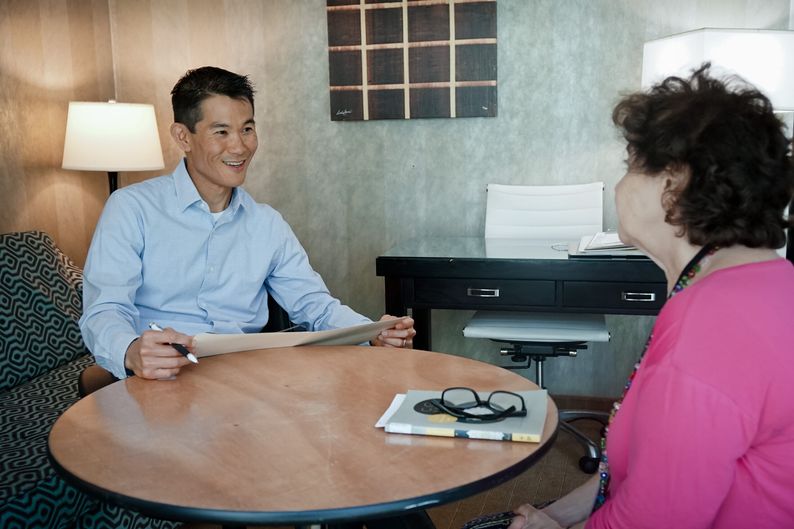Securing Respectful Medical Care
Updated August 12, 2021
By John McDougall
Disrespect shown by doctors towards patients is a major reason for unhappiness with present day healthcare. You are the customer buying professional services and advice, and you ought to be treated with importance. As a satisfied customer, leaving your doctor-patient visit you should, by all rights, be feeling better than before you went in—healthier, happier and more hopeful. Has this been your experience? If not, then why not?
A doctor’s primary, if not the sole, duty is to improve people’s lives. Physicians are rigorously trained for 7 to 12 years to become experts on the mental, emotional and physical complexities of the human being. These professionals are supposed to be the authorities on the healing arts. Every encounter should leave you with an enhanced state of well-being.
Unfortunately, too often patients leave their 7-minute office visit feeling dissatisfied, frightened, angry, saddened, hopeless, rushed and out of control. Something is seriously wrong and it is not the patient’s fault, nor is it the patient’s obligation to remedy this dysfunctional relationship. The medical profession needs to fix itself; but it won’t, because there is little motivation for change—since almost all doctors are very busy, making buckets of money under the present system.
Because of their pivotal position in all medical decisions these professionals have the potential to do you great good—as well as great harm. Let me offer you these suggestions for getting the due respect and the very high quality care you deserve when you must visit a doctor. (In my October 2005 newsletter, I discussed how to find the right doctor.)
Make an Agenda
Prepare for your next doctor’s appointment as you would for an important business meeting—your life could depend on it. You would never hold a conference without a written agenda of the matters to be discussed. Your doctor’s appointment requires the same diligent document preparation.
The agenda serves many purposes:
- It will remind you of all important items. Write down the most important topics and questions first.
- Having a list of questions shows your doctor that you value this appointment time enough to come prepared.
- Because it is written down, each and every item on the agenda must be addressed; this provides you with a great deal of control over the course of the meeting.
- Because every item on your list obviously must be covered, the agenda prevents you from being rushed. However, if inadequate time has been set aside to discuss all of your items, then just make another, longer appointment.
- This agenda facilitates communications. For example, people who are easily intimidated by their doctor can simply hand over the list and ask that each item be addressed. No spoken words are necessary.
Take the Lead in the Conversation
Most of the time, the diagnosis of your problem is based upon the story you tell the doctor. Seldom does the physical examination and subsequent laboratory or imaging tests make the diagnosis. Therefore you must communicate effectively to get the best care possible. Talk freely to the doctor about how you feel. Don’t wait to be asked! Don’t be embarrassed.
- Write down details of the recent changes (signs and symptoms) and relevant events that caused you to make this appointment. Separate this relevant, recent history from items of the distant past.
- Bring a “health history” list with you. Make it concise. A bullet point list with dates is easy for the doctor to read. Include your past illnesses, hospitalizations, major accidents and family history.
- Have copies of reports from other doctors or hospitalizations that are pertinent to this visit. Include all important x-rays and other laboratory tests.
- Bring your bag of pills—including all your herbal tonics, natural remedies and supplements. If you don’t have the original pill bottles, then be sure to have the correct medication names written down and their correct dosage.
- Make a list of all medication allergies and any other foods and substances to which you have reacted adversely.
Finally—and after the doctor has had a chance to give you his or her opinion—don’t hesitate to tell the doctor exactly what you think about your problem. After all, no one knows you better than you do—you are the expert on you. Tell the doctor what you have concluded—your diagnosis—based on living with your troubles. Explain, also any fears you may have about your condition—that you might have cancer, heart disease, diabetes etc. Your insights will be crucial to resolving your health problems.
Research Before the Meeting
The better prepared you are when you arrive at your office visit the more effectively your time will be spent. Investigate any topics that should be discussed, like choice of treatment for diabetes, high blood pressure, coronary artery disease etc. My favorite medical research site is the National Library of Medicine at www.nlm.nih.gov. Enter your questions using “and” – for example: diabetes and treatment and diet. This is a free site.
Are You Really Going Alone?
A new car salesman once told me that a man alone on the showroom floor was an easy “mark.” However, when his wife was along the sale could take him all afternoon, and the customers always got a better deal when they worked together. Having someone—a spouse, parent, child, friend—accompany you to the doctor’s office puts you at an advantage. You have changed the balance of communication—now it’s two against one; and you have created a more even exchange with the “all-knowledgeable doctor.” Your companion will be able to ask additional questions, and hear and remember important bits of information that you might miss. Plus the emotional support is invaluable. When there are important decisions to be made, such as a lifetime of medication or a possible surgery, then take along your support.
Demand Respect for Your Time
Maybe they call it the “patient’s waiting room,” because you are expected to wait—patiently? Long delays before seeing the doctor are so common that bringing a book to an appointment is routine. A reasonable delay may be 15 minutes—any longer than that sends a clear message that your time is of little value. Occasionally an emergency for the doctor can happen; but routine hour-long waits are a clear case of poor business practice—and you should not tolerate it. This frustrating beginning spoils the chances for you to get the excellent care you deserve—an hour spent fuming in the waiting room will, for one thing, raise your blood pressure sky-high.
I believe this practice continues mostly because it is tradition and few people have complained loudly enough to make any change. In truth, respect in most offices is limited to a demand for respect for the doctor’s authority. It is time for you to speak up.
Explain to the people at the reception desk that your time is valuable and you do not want to be kept waiting. Call before your appointment and ask if you will be seen on time—or sarcastically ask, “How far is the doctor behind today?” When it seems that you will have to wait, offer your cell phone number and ask to be called with an updated time for the appointment. You might also try for the first appointment in the morning or after lunch.
Proper Office Behavior
Your initial visit with the doctor should be to gather information. Ask lots of questions. If you don’t ask then the doctor may think you understand everything. Pictures drawn by the doctor may help explanations. You should be taking notes. Ask the doctor to write down any specific instructions you need. Some doctors won’t mind if you make a tape recording of the visit—but ask first. Before leaving ask for any instructional materials (videos, brochures, etc.), especially research papers that are available.
By the end of the visit you should have a clear idea of the doctor’s investigation and treatment plans including any tests, specialists, and follow-up appointments that need to be made. If after you leave, things become unclear or other problems develop, then you should feel welcome to call or e-mail the office and communicate with the doctor and/or a staff member for more information.
Questions to Ask Your Well-Paid Expert
Start asking questions while in the office—even if you know nothing about the condition that you have just been told about. Ask:
- What’s the cause? (How did I get this?)
- How will this condition affect my life?
- How will my condition affect others?
- Do you have a cure?
- How long must I take this treatment?
- If you had my condition what would you be asking right now, Doctor?
- If you had this condition who would you go to for care?
- Are there doctors holding opinions that disagree with your approach?
- Do you have anything I can read to show the benefits of your prescription? Any scientific reference papers or medical journals?
- Do you have other patients who have similar problems that I can talk to?
- Do you have any patients that you have treated who would share their experiences with me?
- Does diet and lifestyle have anything to do with this problem?
Don’t Be Sold on Your First Visit
Most salespersons know this cardinal rule: If they fail to sell the customer on the first contact then they have less than a 10% chance of ever making the sale. Most patients allow themselves to be sold too easily. After one high blood pressure reading they are placed on a lifetime of medication. They agree to schedule surgery for the next available opening without a pause for thought. No!
Get off the showroom floor—out of the doctor’s office—and give yourself some time to think, and do some research, before you buy—just as you would if you were buying a TV or a washing machine. Your health-care purchase deserves more consideration than household appliances.
While sitting in the waiting room you should practice an exercise of saying “No”—maybe 1,000 times—so the word easily rolls off your lips when the doctor dictates what treatments you must follow and what drugs you must take.
After Visit Evaluation
You should feel good, or at least better, after leaving the office. Was a good job done of relieving some or all of your suffering, or was your discontent increased?
Evaluate Your Doctor’s Visit
- Was the office staff helpful, friendly, and courteous?
- Did you like and have feelings of trust for the doctor?
- Did you feel better after the visit than before?
- How long did you wait before you were seen?
- Was everyone respectful?
- Were you comfortable talking to the doctor?
- Did the doctor ask you questions and listen to your answers and seem interested?
- Did you get all your questions answered?
- Did you understand the doctor’s explanations?
- Did you feel rushed?
- Was your privacy valued?
- Did the doctor answer you with a prescription pad in hand?
- Were pills (or surgery) the only solution offered?
- Were the side effects of any proposed treatments explained?
- Were any alternative solutions offered?
- Did the doctor give you the option of no treatment?
- Were you given scientific support for any recommendations?
- Were suggestions made to help and encourage you to prevent illnesses—did the doctor talk about your weight, your exercise and your bad habits?
- Did the doctor suggest curing your problems by changing to a low-fat (McDougall-type) diet and moderate exercise?
If you are satisfied with the experience you had with the doctor and staff, GREAT! Tell your friends. If your visit was not to your liking, remember, the choice is yours—you are the customer—try another doctor.
If you’ve tried all of the above and still can’t find that perfect doctor, consider becoming a patient of ours by signing up for our 12-Day McDougall Program.
Recommended Articles

Finding a Healthcare Provider

The Real Coconut Oil Miracle: How a High-Fat, High-Calorie Condiment Became a “Superfood”






